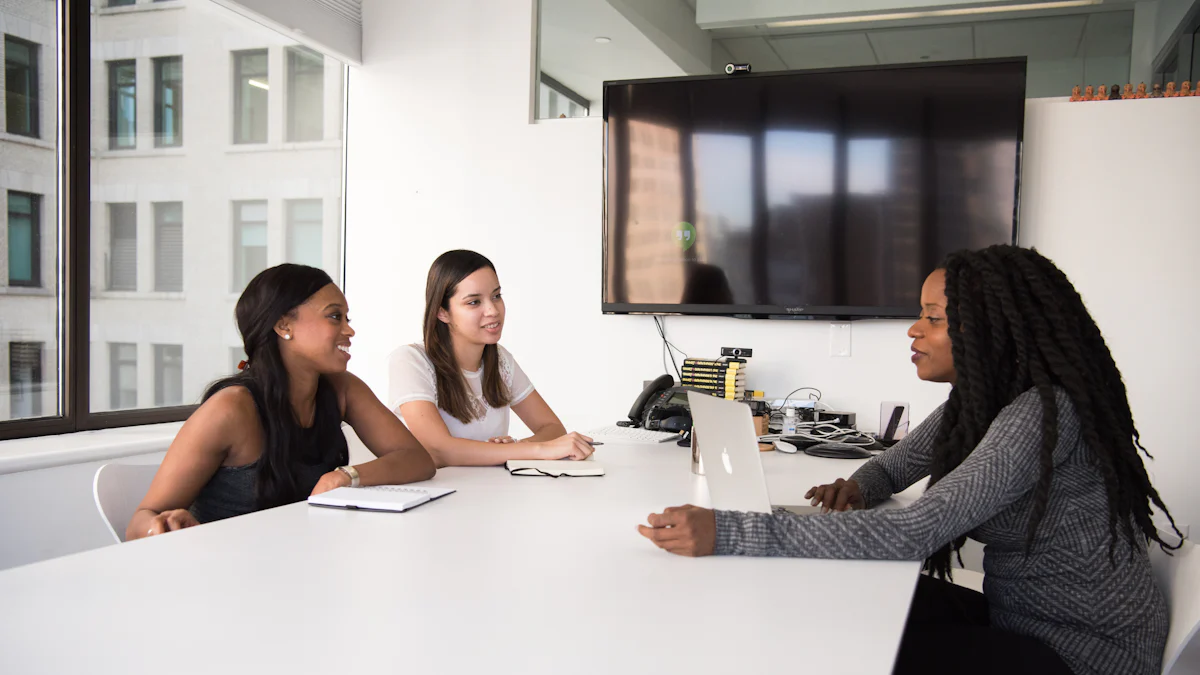How to Ace Ernst and Young Behavioral Interviews in 2025
Try Aihirely for
Smarter Interview Prep
Experience real-time AI support tailored to your Resume.
Boost your confidence and ace every question with
AI Mock Interview.

Image Source: pexels
Preparing for Ernst and Young’s behavioral interviews can seem daunting, but tackling behavioral interview questions Ernst and Young uses with the right strategy can help you excel. These interviews allow you to demonstrate who you are beyond your resume. To perform well, concentrate on three essential areas: thorough research, consistent practice, and aligning your experiences with EY’s core values. Make sure your responses are clear and structured, explaining your thought process in detail. Avoid giving vague answers and emphasize qualities like integrity and teamwork. Treat this as your chance to share your story—one that highlights why you’re an ideal match for Ernst and Young.
Key Takeaways
-
Learn about Ernst and Young’s values like honesty and teamwork. Share your experiences that match these values to show you fit in.
-
Follow the STAR method (Situation, Task, Action, Result) to answer questions. This helps you give clear examples from your past work.
-
Practice interviews to feel more confident. Change your answers to fit the job and EY’s values to stand out.
-
Don’t give unclear answers. Share real examples that show your skills and how you solved problems before.
-
Send a thank-you email after the interview. This shows you are polite and still interested in the job.
Understanding Behavioral Interviews at EY

Image Source: unsplash
What Are Behavioral Interviews?
Definition and purpose of behavioral interviews
Behavioral interviews focus on how you’ve handled situations in the past to predict how you’ll perform in the future. Instead of asking hypothetical questions, the interviewer wants real examples from your experiences. These interviews dig into your problem-solving skills, teamwork, leadership, and how you approach challenges. The goal is to uncover your thought process and decision-making style.
Think of it as storytelling. You’re not just listing achievements—you’re explaining the “how” and “why” behind them. This helps the interviewer see the person behind the resume and understand how you’ll contribute to their team.
How they differ from technical or traditional interviews
Unlike technical interviews, which test specific job-related skills, behavioral interviews focus on soft skills and personal qualities. For example, instead of asking you to solve a coding problem, they might ask how you handled a conflict with a coworker. Traditional interviews often stick to general questions like “What are your strengths?” Behavioral interviews, on the other hand, are more specific and situational.
At Ernst and Young, these interviews are designed to explore your alignment with their values and competencies. You’ll likely face behavioral interview questions ernst and young uses to assess how well you fit into their collaborative and innovative culture.
Why EY Uses Behavioral Interviews
Assessing past behavior to predict future performance
Ernst and Young believes your past actions are the best indicators of your future success. By asking about real-life scenarios, they can evaluate how you’ve handled challenges, worked with others, and achieved results. For instance, if you share a story about leading a team under pressure, they’ll look for clues about your leadership style and ability to stay calm.
Behavioral interview questions ernst and young asks often focus on key traits like adaptability, problem-solving, and communication. These qualities are essential for thriving in their fast-paced, client-focused environment.
Evaluating cultural fit and alignment with EY’s values
EY’s culture revolves around integrity, teamwork, and innovation. They want to know if you’ll thrive in their environment and contribute to their mission. Your answers should reflect these values. For example, if you’re asked about a time you worked in a team, highlight how you collaborated effectively and supported others.
By using behavioral interviews, EY ensures they hire people who not only have the skills but also share their vision. It’s your chance to show how your experiences align with their goals and why you’re the perfect fit.
EY’s Recruitment Process: What to Expect
Key Stages of the Hiring Process
Application and resume screening
The first step in EY’s recruitment process is submitting your application and resume. This stage is all about making a strong first impression. Your resume should highlight your achievements, skills, and experiences that align with EY’s values. Make sure it’s tailored to the role you’re applying for. EY’s recruiters will screen your application to determine if you meet the basic qualifications and stand out as a potential fit.
Online assessments and initial interviews
If your application passes the screening, you’ll move on to online assessments. These tests evaluate your cognitive abilities, problem-solving skills, and sometimes your personality traits. After that, you may have an initial telephone interview. This interview typically lasts about 30 minutes and focuses on your background, motivations, and interest in EY.
Behavioral interviews and final rounds
The final stages include video and on-site interviews. The video interview often has two parts, each lasting 30 to 45 minutes. One part will focus on behavioral interview questions ernst and young uses to assess your past experiences. On-site interviews usually consist of three rounds, each lasting 30 to 45 minutes. These interviews dive deeper into your skills, cultural fit, and alignment with EY’s values.
Here’s a quick overview of the process:
| Stage | Duration |
|---|---|
| Initial Telephone Interview | Approximately 30 minutes |
| Video Interview | 30 to 45 minutes each |
| On-Site Interviews | 30 to 45 minutes each |
| Overall Process | 6 to 8 weeks |
Behavioral Interview Format
Typical structure, duration, and types of questions
EY’s behavioral interviews follow a structured format. You’ll typically face five questions, each starting with prompts like “Tell me about a time when…” or “Give me an example of…” You’ll have 60 seconds to prepare and 90 seconds to respond to each question. These interviews focus on real-life scenarios, so be ready to share specific examples from your past experiences.
What EY aims to assess through behavioral interview questions
EY uses behavioral interviews to evaluate key traits and skills. They’re looking for qualities like teamwork, adaptability, leadership, and ethical integrity. For example, you might be asked to describe a time you collaborated with a team to solve a problem. Your answer should highlight your ability to communicate effectively, contribute to the group, and achieve results. EY places a strong emphasis on teamwork because it’s central to their culture and client service. Demonstrating these skills will show that you’re a great fit for their collaborative environment.
Researching EY: Values, Culture, and Competencies

Image Source: pexels
EY’s Core Values and Culture
Integrity, teamwork, and innovation as key values
Ernst and Young’s culture revolves around a strong set of core values that guide everything they do. These include:
-
People-Centric Approach: EY values collaboration and recognizes employees as their greatest asset.
-
Integrity and Respect: Ethical behavior and mutual respect are non-negotiable.
-
Innovation and Initiative: EY encourages employees to think creatively and take the lead.
-
Inclusivity and Diversity: They embrace diverse perspectives to drive better decision-making.
These values create a workplace where teamwork thrives, and innovation flourishes. EY’s focus on integrity ensures that employees maintain high ethical standards in every interaction.
How to demonstrate alignment with EY’s culture during the interview
To show you’re a cultural fit, highlight examples where you’ve worked collaboratively or taken the initiative. For instance, share a story about a time you led a diverse team to solve a problem. Be sure to express enthusiasm for EY’s mission and values. Research their culture beforehand and weave their values into your responses. For example, if asked about teamwork, mention how you value inclusivity and respect in group settings.
Identifying Key Competencies
Leadership, adaptability, and problem-solving as essential traits
EY looks for candidates who can lead, adapt, and solve problems effectively. These skills are critical in their fast-paced, client-focused environment. Leadership shows you can inspire and guide others. Adaptability proves you can handle change. Problem-solving demonstrates your ability to think critically and deliver results.
How to showcase these competencies in your responses
Use the STAR method (Situation, Task, Action, Result) to structure your answers. For example, if asked about leadership, describe a time you led a team through a challenging project. Explain how you adapted to unexpected changes and solved problems to meet the deadline. This approach makes your responses clear and impactful.
During the interview, focus on specific examples that align with EY’s values. Show how your experiences reflect their emphasis on teamwork, innovation, and integrity. This will help you stand out and demonstrate why you’re the right fit for the role.
Preparing for Behavioral Interview Questions at Ernst and Young
Using the STAR Framework
Explanation of the STAR method (Situation, Task, Action, Result)
The STAR framework is a powerful tool for answering behavioral interview questions. It helps you organize your thoughts and present your experiences clearly. Here’s how it works:
-
Situation: Start by describing the context or background of the situation.
-
Task: Explain the specific challenge or responsibility you faced.
-
Action: Detail the steps you took to address the task or problem.
-
Result: Share the outcome of your actions, focusing on the positive impact.
This method ensures your answers are structured and relevant. Instead of rambling or giving vague responses, you’ll provide a clear narrative that highlights your problem-solving skills and achievements.
Why STAR is effective for structuring responses
STAR works because it keeps your answers focused and easy to follow. It encourages you to share real-life examples, which are more compelling than hypothetical scenarios. This approach also helps interviewers gather objective data about your skills and decision-making process. By using STAR, you’ll show EY that you can think critically and communicate effectively—two qualities they value highly.
Common Behavioral Interview Questions and Sample Answers
Here are some examples of behavioral interview questions you might encounter at Ernst and Young:
-
Tell us about a time you had to work in a team and faced a challenge.
-
What’s your biggest strength, and how have you leveraged it in a previous role?
-
Tell us about a time when you had to resolve a difficult situation with a colleague or client.
-
Can you give an example of when you had to work on a project with a tight deadline?
-
What would you do if you disagreed with your manager’s decision about something you’ve worked on together?
For instance, if asked about teamwork, you could say:
“In my previous role, I worked on a team project with a tight deadline. The situation was challenging because we had conflicting ideas about the approach. My task was to mediate and ensure we stayed on track. I organized a brainstorming session where everyone shared their ideas. Then, I proposed a hybrid solution that combined the best aspects of each idea. As a result, we completed the project on time, and the client praised our innovative approach.”
This response uses STAR to highlight teamwork, problem-solving, and communication—qualities EY values.
Practicing Your Responses
Importance of mock interviews and feedback
Practicing your responses is essential for acing behavioral interviews. Mock interviews can help you:
-
Get comfortable with the STAR method.
-
Craft compelling stories that showcase your skills.
-
Prepare for common behavioral questions and reduce anxiety.
-
Improve your overall interview performance through regular practice.
Tailoring answers to EY’s values and the specific role
To stand out, tailor your answers to align with EY’s values and the role you’re applying for. Here’s how:
-
Research EY’s core values, services, and recent news to show genuine interest.
-
Highlight achievements that match the job description.
-
Use STAR to structure your responses and demonstrate analytical skills.
-
Share examples that showcase leadership, initiative, and effective communication.
By practicing and tailoring your responses, you’ll feel more confident and prepared to tackle any behavioral interview questions ernst and young might ask.
Avoiding Mistakes and Standing Out
Common Mistakes to Avoid
Overgeneralizing or providing vague answers
One of the biggest pitfalls in behavioral interviews is giving vague or overly general responses. When you don’t provide specific examples, it becomes harder for the interviewer to understand your skills and experiences. Instead, focus on sharing detailed stories that clearly illustrate your abilities. For example, if asked about teamwork, describe a specific project, your role, and the steps you took to contribute. This approach not only makes your answers more compelling but also shows your ability to articulate your thought process effectively.
Failing to connect experiences to EY’s values
Another common mistake is not aligning your answers with EY’s core values. EY places a strong emphasis on integrity, teamwork, and innovation. If your responses don’t reflect these values, you might miss the chance to demonstrate cultural fit. For instance, when discussing a leadership experience, highlight how you fostered collaboration or upheld ethical standards. Always tie your examples back to what EY values most.
Pro Tip: Consistency is key. Make sure your answers align with the role and EY’s mission throughout the interview.
Tips for Demonstrating Cultural Fit
Showcasing enthusiasm for EY’s mission and work
EY wants candidates who are genuinely excited about their mission. Show your enthusiasm by researching their recent projects, initiatives, or community efforts. Mention what excites you about working at EY and how you see yourself contributing to their goals. For example, if you admire their focus on innovation, share a story where you introduced a creative solution in a previous role. This shows you’re not just interested in the job but also in being part of EY’s larger vision.
Highlighting examples that align with EY’s focus on innovation and collaboration
To stand out, share examples that demonstrate your ability to innovate and collaborate. Talk about a time you worked in a diverse team or took the initiative to improve a process. Highlight how you communicated effectively and contributed to the team’s success. EY values proactive problem-solvers who thrive in collaborative environments, so make sure your stories reflect these qualities.
Quick Tip: Practice articulating your examples clearly to showcase both your technical and interpersonal skills.
Final Preparation Tips
Reviewing your resume and aligning it with potential questions
Before the interview, review your resume carefully. Think about how your experiences align with EY’s values and the role’s requirements. For each key point on your resume, prepare a story that demonstrates your skills and achievements. This will help you answer questions confidently and stay consistent throughout the interview.
Preparing thoughtful questions to ask the interviewer
Asking insightful questions shows you’re genuinely interested in the role and the company. Consider asking about EY’s performance review process or their leadership development programs. You could also inquire about what makes top-performing employees successful at EY. These questions not only demonstrate your curiosity but also help you understand how you can thrive in the organization.
Remember: Thoughtful questions leave a lasting impression. They show you’re serious about your future at EY.
Preparing for an Ernst and Young behavioral interview takes effort, but it’s worth it. Researching EY’s values, practicing your responses, and using the STAR method can make all the difference. When you align your experiences with EY’s core values, you not only demonstrate cultural fit but also set yourself up for long-term success.
| Benefit | Explanation |
|---|---|
| Cultural Fit | Aligning with EY’s values like integrity and teamwork helps create a positive work environment. |
| Long-Term Success | Candidates who fit well with EY’s culture are more likely to stay engaged and satisfied. |
Approach the interview with confidence. Prepare specific examples, articulate your thought process clearly, and avoid contradictions. Remember, EY values integrity, teamwork, and innovation, so let those qualities shine through.
Pro Tip: After the interview, send a thank-you email. It shows professionalism, reiterates your enthusiasm for the role, and leaves a lasting impression.
-
Why send a thank-you email?
-
It expresses appreciation for the opportunity.
-
It reinforces your interest in the job.
-
It demonstrates professional etiquette.
-
By following these steps, you’ll not only ace the interview but also show EY why you’re the perfect fit for their team. Good luck—you’ve got this!
FAQ
What is the best way to prepare for EY’s behavioral interview questions?
Start by researching EY’s values and competencies. Use the STAR method to structure your answers. Practice with mock interviews and get feedback. Focus on sharing specific examples that highlight your skills and align with EY’s culture.
Tip: Tailor your responses to the role you’re applying for.
How can I stand out during the interview?
Show enthusiasm for EY’s mission and values. Share examples that demonstrate innovation, teamwork, and leadership. Ask thoughtful questions about the company and role. Be confident and authentic.
Pro Tip: Mention recent EY projects or initiatives to show you’ve done your homework.
What should I avoid saying in a behavioral interview?
Avoid vague or generic answers. Don’t criticize past employers or coworkers. Stay positive and focus on what you learned from challenges. Never exaggerate or lie about your experiences.
Remember: Honesty and integrity are key values at EY.
How long should my answers be?
Keep your answers concise but detailed enough to cover the STAR framework. Aim for 1-2 minutes per question. Focus on the most relevant details and avoid unnecessary tangents.
Should I send a thank-you email after the interview?
Absolutely! A thank-you email shows professionalism and reinforces your interest in the role. Mention something specific from the interview to make it personal.
Why it matters: It leaves a lasting impression and sets you apart from other candidates.
